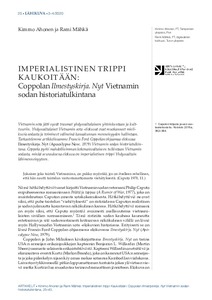Imperialistinen trippi Kaukoitään: Coppolan Ilmestyskirja. Nyt Vietnamin sodan historiatulkintana
Kimmo Ahonen; Rami Mähkä
https://urn.fi/URN:NBN:fi-fe2021042822512
Tiivistelmä
An Imperialistic trip to the Far East: Francis Ford Coppola’s Apocalypse Now as a historical interpretation of the Vietnam War
American-produced films have shaped images of the Vietnam War and
acted as a means of handling the national past. In this article, we
examine Francis Coppola’s film Apocalypse Now (1979) as an
interpretation of the Vietnam War. We focus on the historical
contextualization of the film: how it resonates with the history of the
Vietnam War and is a part of the history of Hollywood’s treatment of the
subject. We also examine Apocalypse Now’s relationship with imperialism and its nature as a war spectacle.
The production of Apocalypse Now was complicated and took
more than a decade to be completed. This article uses both the original
theatrical release (1979) and the extended “Redux” version from 2001 as
its source material. Of the latter, we focus especially on the “French
Plantation” scene, which was omitted completely from the original
version. The scene clearly attempts to contextualize the Vietnam War and
for that reason is an important source for analyzing Apocalypse Now as an interpretation of the historical event.
Finally, we examine the film as a historical film and, as such, a
part of history culture. The film, and the “French Plantation” scene in
particular, carries politically-charged themes of decolonization,
imperialism and US history. Our argument is that Apocalypse Now,
which featured several controversial events and phenomena experienced
by people participating in the film’s production, both reflected and
actively “wrote” the history of the Vietnam War.
Kokoelmat
- Rinnakkaistallenteet [29335]
